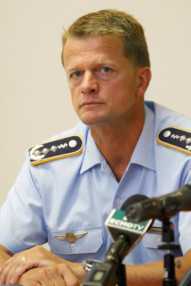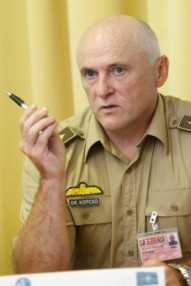The Centre of Excellence will have a department in Munich
Szöveg: Andrea Kánya | 2010. július 29. 22:22On the occasion of reaching full operational readiness the NATO Centre of Excellence for Military Medicine held a press conference to give an accout of their achievements, capabilities and current programs. At the event Col. Dr. Thomas Harbaum, MD, Deputy Director and Col. Dr. István Kopcsó, MD, Director briefed the representatives of the press on the activities of the Centre.
The Budapest-based NATO Centre of Excellence for Military Medicine (MILMED COE) is the nineteenth NATO Centre of Excellence, and the first one in the field of health care. The organisation was accredited and activated by the North Atlantic Council on October 12, 2009.
Col. Dr. Thomass Harbaum, the deputy director pointed out during the conference held on July 27 in Budapest: military medicine meets various international expectations and even though static warfare is a thing of the past, the dynamic wars of the present set different requirements. He underlined that one of the greatest achievements of military medicine was that it has separated from logistics and become independent, therefore supply does not mean the replacement of human resources, we can talk about individual patients and servicemen.

The colonel also told the press that they are expected to provide the same treatment to casualties they would receive at home. “The current situation has revealed that solutions operating on national basis cannot be maintained in the long run, therefore NATO is looking for joint solutions with the participation of several nations in some areas, for example in health care," emphasised the colonel.
Col. Harbaum explained that the key to providing quality treatment is the so-called supply chain, starting from the location of the casualty and ending with strategic aerial rescue in some cases. The deputy director also told the press that the primary aim of the Centre of Excellence for Military Medicine is to train soldiers who can attend to casualties until professional medical staff arrive. The colonel said that since each country runs different trainings, a new (common) standard has to be developed.
The deputy director also spoke about typical injuries and illnesses; 60-80 per cent of troops who are ill have an infectious disease.
Col. Dr. István Kopcsó, the director of the MILMED COE said, continuing the colonel’s train of thought: countries are not capable of operating field hospitals alone, this is why there is a need for the cooperation of nations. He said about the Centre of Excellence that it is a fundamental principle that the activities and products of the centres have to be available to every NATO member state. In addition to that, it is also important that there are no costs to NATO. The director emphasised that doubling of capabilities and competition with existing organisations are not allowed. The doctrines, standards and rules of procedure in effect have to be observed, and it is also important that Sponsor Nations and Strategic Commands foster closer ties.

The director said: a Deployment Health Surveillance Centre (DHSC) has been established in Munich, which will develop the Deployment Health Surveillance Capability.
Col. Kopcsó underlined that in 2010, the DHSC will officially become a department of the NATO Centre of Excellence for Military Medicine. He added that France and Austria have formally announced their intent to join the DHSC project.
Col. István Kopcsó underlined in his summary: the main objective of the Centre is to promote national solutions and develop military medical capabilities.
As regards their future plans, he said they would like to create a NATO Trauma Register, a database that processes experiences, a terminology database, and they want to start test training courses. Their plans also include a course aimed at the management of cases entailing heavy casualties, a ’Medical First Responder’ course, tactical and air MEDEVAC, and the sustainability of mobile medical units. In addition to that, the director also called attention to the issue of state-building, reconstruction and development as well as the deployment health surveillance system.